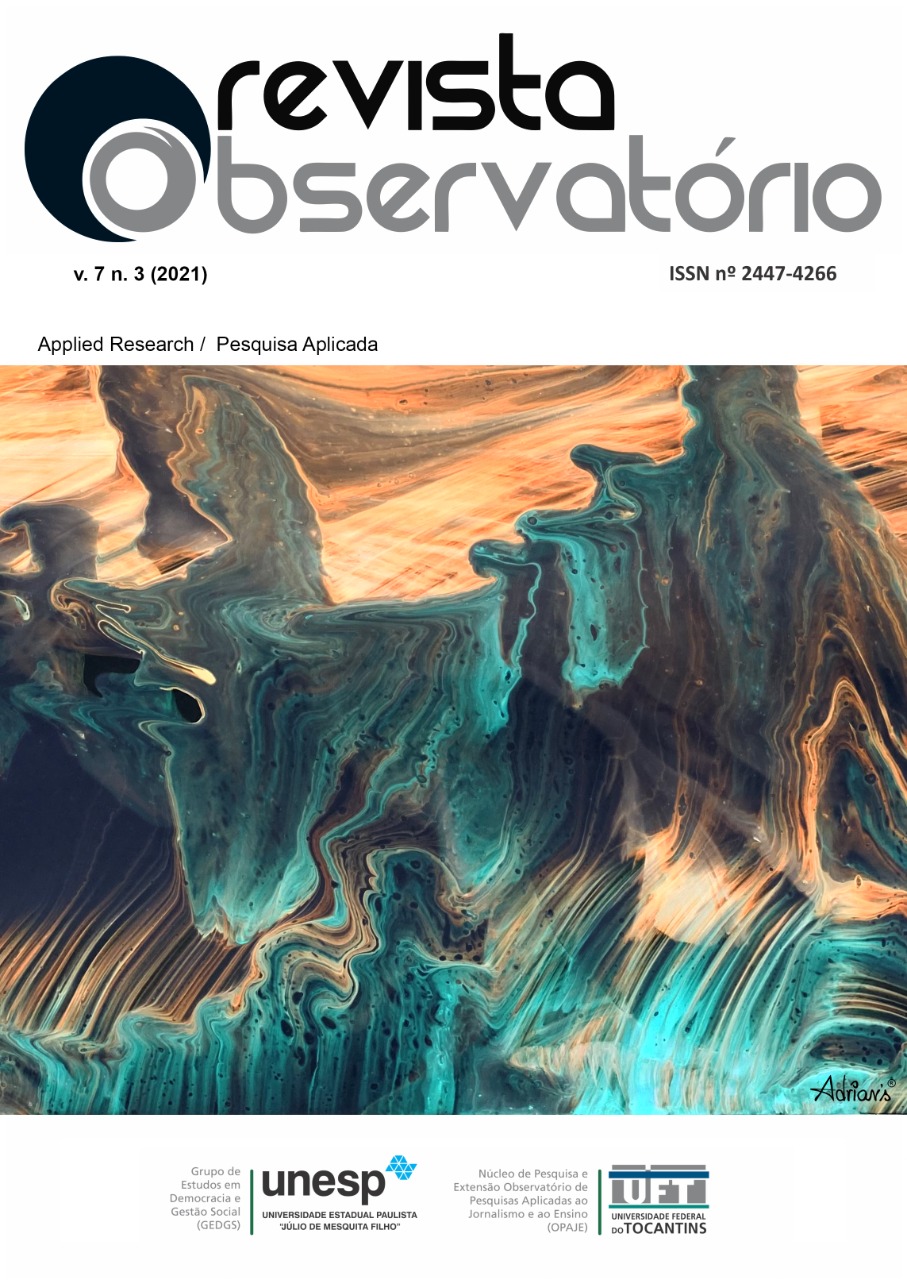FACT-CHECKING IN A CRUMBLING DEMOCRACY: Implementation of “Sem Migué” platform during local elections in São Luís
DOI:
https://doi.org/10.20873/uft.2447-4266.2021v7n3a5enPalavras-chave:
Disinformation, Democracy, Journalism, Fact-checkingResumo
The aim of this research is to test the applicability of a collaborative and decentralized model of fact-checking during the 2020 elections in São Luís/MA. The model was materialized into a platform called “Sem Migué”, in which volunteers had the opportunity to publish their own fact checks in the form of verification forums. The experiment seeks to investigate how this practice could help the participants deal with disinformation. The results will be used as resources in the development of an updated version of the model.
Downloads
Referências
ANDERSON, Chris. Makers: a nova revolução industrial. Tradução: Afonso Celso da Cunha Serra. Rio de Janeiro: Elsevier, 2012.
BENKLER, Yochai; FARIS, Robert; ROBERTS, Hal. Network Propaganda: manipulation, disinformation and radicalization in American politics. Oxford: Oxford University Press, 2018.
CAPOANO, Edson et al. Como se banca o jornalismo: Modelos, tendências e reflexões sobre financiamento de mídia. São Paulo:[sn], 2018.
COSTA, Ramon Bezerra. Economia da confiança: comunicação, tecnologia e vinculação social. Curitiba: Appris, 2018.
FRENKEN, Koen; SCHOR, Juliet. Putting the sharing economy into perspective. Environmental Innovation and Societal Transitions, volume 23, pp. 3-10, 2017.
GIL, Antônio Carlos. Como elaborar projetos de pesquisa. 4ed. São Paulo: Atlas, 2008.
HAIDEN, Leonie; ALTHUIS, Jente. The Definitional Challenges of Fake News. In: International Conference on Social Computing, Behavior-Cultural Modeling, and Prediction and Behavior Representation in Modeling and Simulation, Washington, 2018.
JEMIELNIAK, Dariusz; PRZEGALINSKA, Aleksandra. Collaborative Society. Cambridge, MA: The MIT Press, 2020.
MANTZARLIS, Alexios. Fact-checking 101. In: Journalism, ‘Fake News’ & Disinformation: Handbook for Journalism Education and Training. Paris: UNESCO, 2018.
MENDONÇA, Ricardo Fabrino; FREITAS, Viviane Gonçalves. Fake News e o repertório contemporâneo de ação política. In: Encontro da COMPOLÍTICA, v.8, Brasília, 2019.
MOOGK, Dobrila Rancic. Minimum viable product and the importance of experimentation in technology startups. Technology Innovation Management Review, v. 2, n. 3, 2012.
NORRIS, Pippa; INGLEHART, Ronald. Cultural backlash: Trump, Brexit, and authoritarian populism. Cambridge University Press, 2019.
OSTERWALDER, Alexander; PIGNEUR, Yves. Business model generation: inovação em modelos de negócios. Alta Books Editora, 2011.
RAVENELLE, Alexandrea J. Hustle and Gig: struggling and surviving in the sharing economy. Oakland, California: University of California Press, 2019.
REIS, Julio C.S.; MELO, Philipe; GARIMELLA, Kiran; BENEVENUTO, Fabrício. Can WhatsApp benefit from debunked fact-checked stories to reduce misinformation? Harvard Kennedy School Misinformation Review, 2020.
SANTAELLA, Lúcia. A Pós verdade é verdadeira ou falsa? Barueri: Estação das Letras e Cores, 2018.
WARDLE, Claire; DERAKHSHAN, Hossein. Information disorder: Toward an interdisciplinary framework for research and policy making. Council of Europe report, v. 27, 2017.
Publicado
Como Citar
Edição
Seção
Licença
[PT] Autores que publicam nesta revista concordam com os seguintes termos:
1. Autores mantém os direitos autorais e concedem à revista, sem pagamento, o direito de primeira publicação, com o trabalho simultaneamente licenciado sob a Creative Commons Attribution License (CC BY-NC 4.0), permitindo o compartilhamento do trabalho com reconhecimento da autoria do trabalho e publicação inicial nesta revista.
Leia todos os termos dos direitos autorais aqui.


